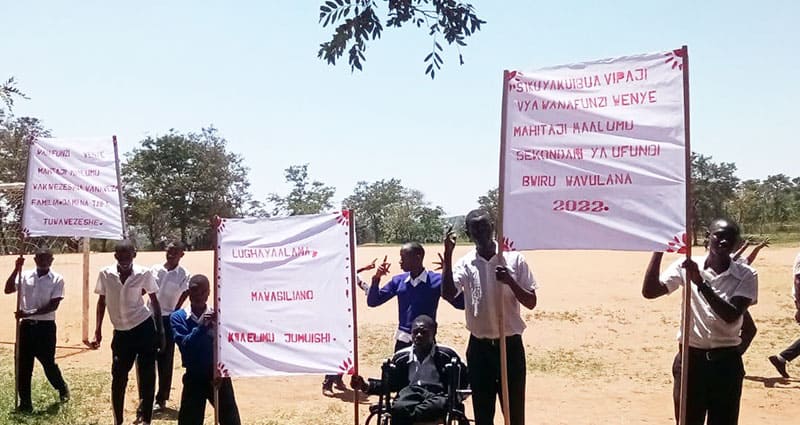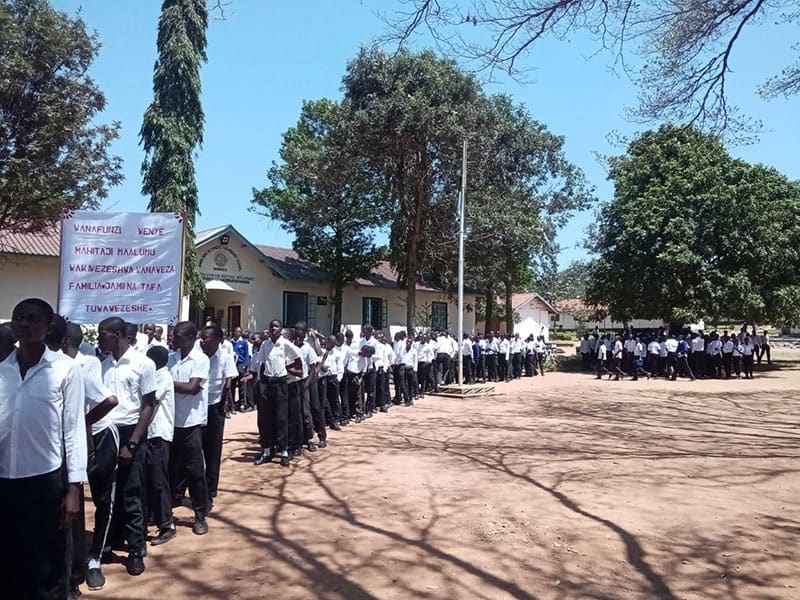Sunday, November 13, 2022
Malachi 3:19-20a; Psalm 98:5-6, 7-8, 9; 2 Thessalonians 3:7-12; Luke 21:5-19
A Maryknoll lay missioner serving deaf and hearing students in Tanzania reflects on signs and the Mass readings for the 33rd Sunday in Ordinary Time.
On a sunny Saturday morning in September, students at the school where I teach marched the short walk from the classroom area to the soccer field in solidarity: hearing, deaf, and of all abilities. The almost 1,000 student-strong group carried three simple signs – white sheets stretched between wooden rods with Swahili words stenciled in red block letters. The signs read:
Lugha ya alama Mawasiliano kwa Elimu Jumuishi
Tanzania Sign Language for Integrated Education
Siku ya kuibua vipaji vya wanafunzi wenye mahitaji maalumu
The day to visualize the abilities of students with special needs
Wanafunzi wenye mahitaji maalumu wakiwezeshwa wanaweza. Familia, Jami and Taifa Tuwawezeshe
Students with special needs can succeed, if their efforts are supported. Families, Community, and Nation, let’s support them!

Students hold signs of support for people with special needs, including the deaf, at Bwiru Boys Technical School in Mwanza, Tanzania. (Courtesy of Steve Veryser/Tanzania)
The march wasn’t a protest organized by students but was part of an event planned by the teachers. The short march never left the school property, and other than the students, only we teachers read the signs. At the time I thought, who are these signs for, anyway? Many of the teachers have specific training in Special Education, including sign language.

Students march at Bwiru Boys Technical School in Mwanza, Tanzania to show support for people with special needs, including the deaf. (Courtesy of Steve Veryser/Tanzania)
I wonder if Christ’s followers had a similar reaction to his insistence about the signs of the end of times. How many times do I have to be reminded of my own mortality to believe and act on it — to really live each day with the urgency of a life passing by? How many times, I wondered, have I heard, read and repeated, “The Lord comes to rule the earth with justice,” as in the Psalms today (and other similar passages about the triumph of justice) and yet still I struggle to actually believe it.
Maybe the signs the students carried really were for us. Both students and teachers need the reminders. In our inclusive education environment, sometimes we teachers slip into speaking without using signs, and explanations are thus lost to the Deaf in our classes. In addition to the signs they carried together, the students reminded us of their abilities through the activities of the event. They showed off and sold well-built wooden stools they had made in the workshop. Deaf students played a football match, and won, against a team of their hearing peers.
Today also happens to be World Kindness Day, an interreligious effort to promote peace through kindness. What a simple concept! One that I need to be reminded of constantly. When I think of working for justice, images that come to mind are of marches, civil disobedience, and mostly confrontation. That I might also think of kindness, understanding, and empathy as paths to do justice seems counterintuitive – though a bit more reachable than the upending type of activism of my initial impressions.
Extending the message of the student’s signs, we can easily get to:
“Learn each other’s languages to understand and appreciate each other”
“Take a day to appreciate the success of others”
“Spread kindness starting in our Families, Communities, Nation, and between nations!”
Just like with us teachers, in order to put these noble intentions into practice, we need plenty of reminders both in word and in action, as well as follow-through with diligence and with kindness, to ourselves and others.
To read other Scripture reflections published by the Maryknoll Office for Global Concerns, click here.
Featured image: Student athletes line up on the soccer field at Bwiru Boys Technical School in Mwanza, Tanzania. The school includes both hearing and deaf students. (Courtesy of Steve Veryser/Tanzania)

